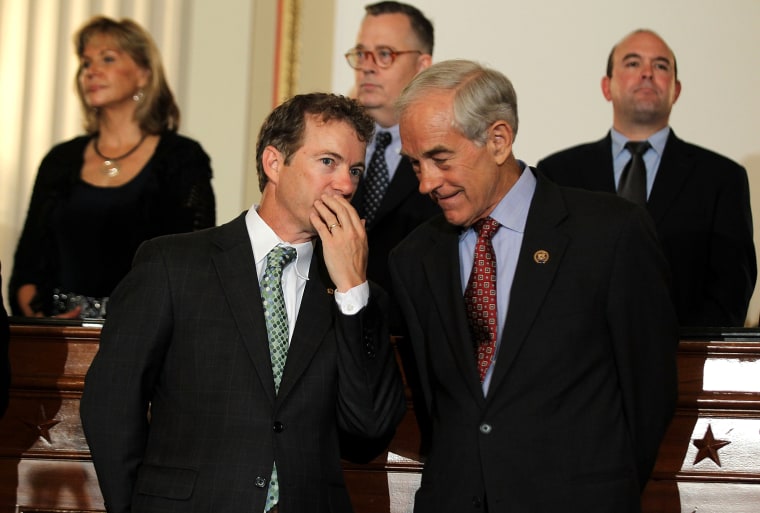On "Meet the Press" yesterday, host Chuck Todd and Sen. Rand Paul (R-Ky.) spoke a bit about the senator's father, former Rep. Ron Paul (R-Texas), and the fact that Rand Paul said a few years ago that "the Ron Paul revolution is the last best hope for saving the GOP from oblivion."
The Kentucky Republican laughed it off as "rhetorical flourishing," but added that he's a "great fan" of his dad. "I think he's one of the few honest and genuine people in politics," Rand Paul said. "So, I do mean that in my support."
It led to this memorable exchange:
TODD: Where do you disagree with your dad? Give me three areas. PAUL: You go first. Where do you disagree with your dad and then I'll go to mine.
This could theoretically be a compelling response if Chuck Todd were a presidential candidate, if Chuck Todd's father was a former presidential candidate, and if Chuck Todd had spent much of his adult life promoting a strange political movement based on his odd familial worldview.
But since none of those elements is true, the senator's response wasn't altogether satisfying.
It was, however, a reminder that the Kentucky Republican has a past that he'd like voters and reporters to overlook.
Andrew Kaczynski the other day noted a small sampling of the "interesting" things Rand Paul said shortly before launching his Senate bid, including accusing then-Vice President Dick Cheney of enriching himself by "hundreds of millions of dollars" by giving Haliburton contracts as secretary of defense in the 1990s and then going to work for the company.
As of last week, the senator suggested these and other comments no longer count, as if there's a statute of limitations that has run out. The same day as his presidential campaign kickoff, Paul sat down with Fox's Sean Hannity, and when the host noted some of his previous comments, the senator, "I also wasn't campaigning for myself; I was campaigning to help my father at the time."
Asked specifically about the Cheney allegation, Rand Paul added, "That was a long time ago" -- as if to say his pre-Senate record simply doesn't count.
In his suddenly infamous interview with NBC's Savannah Guthrie, the "Today" show host also pressed the candidate on some of his contradictions and reversals. At one point he replied, "2007 was a long time ago," again suggesting the Kentucky lawmaker doesn't think his past counts.
The problems with the argument are obvious. For one thing, we're not just talking about youthful indiscretions that seem irrelevant decades later; we're talking about public remarks Paul made as a surrogate for a presidential candidate. In fact, many of these quotes really aren't that old at all -- he accused Cheney of corruption in 2009, the same year he launched his Senate campaign.
For another, whether Rand Paul likes it or not, presidential candidates don't have the luxury of declaring much of their adult lives off-limits to scrutiny. So long as he's being quoted accurately, his public remarks on major issues of the day matter and deserve consideration as he seeks the nation's highest office.
And finally, Rand Paul invested quite a bit of time last year arguing that Bill Clinton's '90s-era controversies should matter in 2016. I hate to break it to the senator, but if 1995 counts, so too does 2009.
Postscript: As long as we're on the topic, let's also not forget that the senator may yet be vulnerable when it comes to some of his father's scandals.
